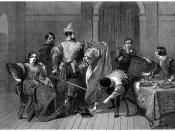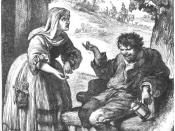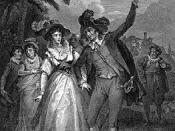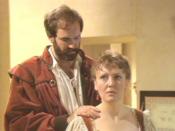Looking past the Humor The modern perspective of entertainment as well as social issues are far fetched from the perspectives of the audiences and people of the Shakespearian era. In Taming of the Shrew Shakespeare uses humor to exploit social hierarchy issues and the issue of battle of the sexes. It is very evident that the play would be very controversial today in modern times. This play clearly brings serious social issues of Shakespeare's time to light and it exposes the imbalanced rules of this patriarchal society through humor that the modern day society cannot identify with.
The Taming of the Shrew is centered on the idea of social hierarchy. In the beginning of the play we are introduced to a drunkard who is tricked into thinking he is a Lord. This cruel act of trickery is the first introduction to the rules of social hierarchy of the late sixteenth century.
From a modern perspective this scene is not funny at all. Shakespeare tries to use humor to portray how people of the higher class treat people who are beneath them. "I know the boy will well usurp the grace, Voice, gait, and action of a gentle woman. I long to hear him call the drunkard husband, and how my men will stay themselves from laughter (Shakespeare 50)."ÃÂ Modern audiences don't think that entertainment should be deceitful. Using lies as a source of humor would not appeal to the average person today. Audiences today would feel more sympathetic and sorry that Christopher Sly is being tricked. They would much rather see the rich give to the poor and help them get out of their situation. The attitudes of people in this modern day society are geared towards the idea that everyone is equal and deserve the same rights. Even though the play does not go on to tell what happened to Christopher Sly it is fair to say that he was probably eventually humiliated.
The social issue of love is incredibly significant in this play. The modern societies of today decide to marry because of love instead of wealth. From a woman's perspective the idea of your father choosing your husband for you would seem absurd. Baptista believes that the amount of wealth that Bianca's suitors are willing to give to her is based on how much they love her. On the other hand because Katherine is so shrewish he readily accepts Petruchio's offer of marriage to her. Shakespeare turns this suitor competition into a game and the women are being bought as prizes. "Gremio "ÃÂtis now time to vent our love. Listen to me, and if you speak me fair, I'll tell you news indifferent good for either. Here is a gentleman whom by chance I met, Upon agreement from us to his liking, Will undertake to woo Katherine, Yea, and marry her if her dowry please (73)"ÃÂ. Petruchio is actually paid by Gremio and Hortensio to marry Katherine. The modern idea of love is honest. In the eyes of our modern day society Katherine was basically being indirectly sold as a prostitute without her even knowing about it. Shakespeare really makes Katherine look like a fool because she is in the dark and the men are laughing at her on the inside. Women today would not consider this to be a laughing matter. Instead they would be furious at the fact that men would take advantage of them in this manner. Katherine being the type of strong-willed person she is, would have not been so easily wooed by Petruchio had she known how he really won her dowry.
Consequently, along with the social issues of hierarchy and love comes obedience. Shakespeare truly intends to cover this subject up with humor because obedience is a crucial concern in this society of patriarchal hierarchy. Obedience is the foundation that keeps the society in order.
Where be these knaves? What no man at door to hold my stirrup nor to take my horse? Where is Nathaniel, Gregory, Philip? Here, here, sir, here, sir. Here, sir, here, sir, here, sir! You loggerheaded and unpolished grooms! What, no attendance? No regard? No duty? Where is the foolish knave I sent before? Here, sir, as foolish as I were before (112).
The servants are considered inferior to their masters and therefore they must obey every order they give to them. Shakespeare uses this inferiority as humor by playing on the fear of the servants. Instilling fear in others is not a funny matter at all. It is actually very sad because people should want to be obedient out of their own will and not out of fear. Shakespeare reveals that the rich had power because people feared they would lose their lives. The fact that it was expected for those of lower classes to be submissive would be considered ridiculous in these days and times. Even though money and wealth does come indirectly with authority and power modern day people still demand respect and justice. In addition to Shakespeare revealing the unfair treatment of servants in terms of obedience, women encounter these same problems. Since women in this era were dependent upon their husbands and Fathers for everything, they had to comply with their rules.
Thus I have politicly begun my reign, and "ÃÂtis my hope to end successfully. My falcon now is sharp and passing empty, and till she stoop she must not be fully gorged, for then she never looks upon her lure. Another way I have to man my haggard, to make her come and know her keeper's call, that is to watch her as we watch these kites that bate and beat and will not be obedient (115).
Shakespeare exposes that women are trained to be obedient to their husbands and that they make their wives grow to be reliant upon them. The majority of women today are extremely independent of their husbands and would reject the idea of being trained to act a certain way towards their husbands. Shakespeare defines a wife as basically a servant to her husband. Today husbands and wives are considered to be equal counterparts.
Finally, the idea of sexism ties all these issues together to lead to the larger issue of male dominance. Shakespeare uses the title of this play to indirectly refer to male dominance. If in fact the title had suggested that the "Shrew"ÃÂ was a man, Shakespeare would not have been able to label this play a comedy. It would have been considered out of the social order to have a man be tamed by a woman. Shakespeare probably intended for the scene at Lucentio's house at the end of the play to reveal to his audience that in this society men are rulers over women but he brilliantly incorporates the idea that women do not have to be ruled by men. They have the right to be their own boss.
Sir, my mistress sends you word that she is busy and she cannot come. How? She's busy and cannot come? Is that an answer? Ay, and a kind one too. Pray God, sir, your wife send you not a worse. Sirrah Biondello, go entreat my wife to come to me forthwith. Now where's my wife? She says you have some goodly jest in hand. She will not come. She bid you come to her. Worse and worse. She will not come. O vile, intolerable, not to be endured (147-48).
Shakespeare could not leave this out lash by Bianca and the Widow unsettled because the audience is expecting that the women will be reprimanded in some way or form by their husbands for disobeying their orders. As a result Shakespeare pleases the egos of all the men when he have Kate tell Bianca and the Widow what duty they owe to their husbands and Lords. "Thy husband is thy Lord, thy life, thy keeper, thy head, thy sovereign ÃÂþone that cares for thee (150)"ÃÂ. Male dominance is therefore restored because the women are reminded of their rightful place. The modern perspective of this issue would really hit home for today's audiences because women still have trouble today competing with males for equality.
Therefore because society has undergone a tremendous amount of change since Shakespeare's time the issues that he exposes through humor are not taken lightly. People today have been instilled with values of equality. Men and women have very different roles in the modern day societies compared to the roles they had in Shakespeare's time. Women are leaders and not followers and men are not expected to be the backbone. Responsibilities are shared and decision making is a mutual process. Also wealth does not buy love. I believe that Shakespeare intended for his audiences to look past the humor and arrive at the deeper issues that trouble their society.





